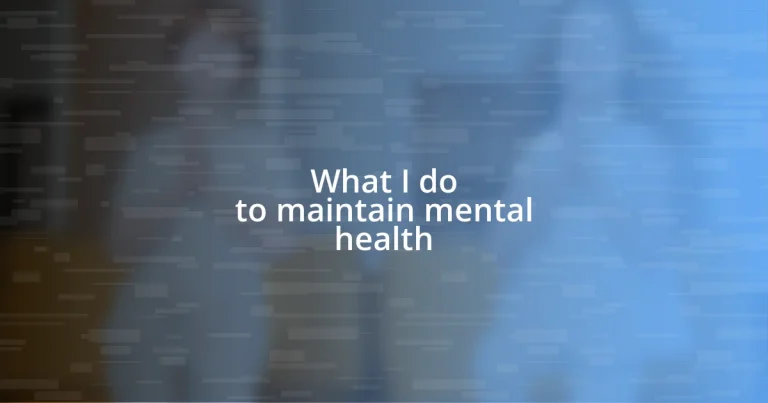Key takeaways:
- Mindfulness and routine establish mental stability, reducing anxiety and enhancing overall well-being.
- Building supportive relationships through friends and family fosters a sense of belonging and provides emotional relief.
- Seeking professional help can aid personal growth and understanding, reinforcing the importance of finding the right mental health professional.

Understanding mental health strategies
Mental health strategies are often tailored to fit an individual’s unique needs, yet some common approaches can be quite effective. Personally, I’ve found that practicing mindfulness is a game changer. Whenever I feel the heaviness of stress creeping in, just taking a few moments to ground myself in the present—whether it’s through deep breathing or simply focusing on my surroundings—can provide significant relief. Have you ever noticed how just a few mindful breaths can shift your perspective?
Another essential strategy I embrace is establishing a routine. I remember when my life felt chaotic, and everything seemed overwhelming. Developing a daily schedule brought a sense of control and predictability. It’s interesting how carving out time for self-care within our busy lives can create a mental sanctuary, don’t you think? Regular habits, even something as simple as a morning walk, can build a vital foundation for mental well-being.
Social connections also play a pivotal role in maintaining mental health. I recall a particularly tough week when I reached out to a friend for a chat; it made a world of difference. Those moments of genuine connection can remind us we’re not alone in our struggles. Isn’t it comforting to think that opening up to someone can lighten your emotional load? Engaging in these strategies allows for a deeper understanding of our mental health journey.

Importance of daily routines
Establishing daily routines has been a cornerstone of my mental health maintenance. When I first committed to setting consistent wake-up and sleep times, I noticed a remarkable shift in how I approached the day. The predictability in my schedule reduced anxiety levels significantly; it’s almost like having an anchor amid life’s unpredictability. Have you experienced the calming effects of knowing what your day looks like?
I find that integrating small, enjoyable activities into my daily routine can have a tremendous impact on my mood. For instance, I always take 10 minutes to enjoy my coffee in silence before jumping into work. This tiny ritual sets a positive tone for the day and allows me to cherish those still moments. It’s fascinating how something so simple can create a sense of joy and presence, doesn’t it?
Moreover, I’ve noticed that routines give me purpose, especially on days when motivation wanes. There are mornings I wake up feeling low, and sticking to my established plan helps me push through. Whether it’s my workout or simply getting dressed, these tasks pull me out of a funk. Consistency in my daily structure serves as a silent motivator, reminding me that I have the power to shape my day, regardless of how I feel.
| Benefit | Impact on Mental Health |
|---|---|
| Routine | Creates stability and predictability, reducing anxiety. |
| Enjoyable Activities | Enhances mood and fosters sense of joy. |
| Purpose | Provides motivation, even on low-energy days. |

Practicing mindfulness and meditation
Practicing mindfulness and meditation has transformed the way I cope with life’s challenges. I recall a time when racing thoughts kept me up at night. I turned to guided meditations, which helped me focus on my breath and quiet my mind. Those sessions have become a refuge, almost like hitting the reset button on my mental state. Have you experienced that serene moment where everything else fades away?
Incorporating mindfulness into my daily routine has also been enlightening. I try to engage in mindfulness practices, whether through a quick five-minute meditation during lunch or even while enjoying a leisurely walk. These small but meaningful moments can create a ripple effect throughout my day. Here are some specific techniques I find helpful:
- Breathing Exercises: Five deep breaths can ground me and bring awareness to the present moment.
- Body Scan: Tuning into physical sensations helps me release tension I didn’t realize I was holding.
- Mindful Eating: Savoring each bite turns mealtime into a meditative experience.
- Nature Walks: Being in nature allows me to connect deeply with my surroundings, enhancing my sense of peace.
By practicing these techniques regularly, I’ve found a newfound clarity that helps me navigate stress with greater ease. It’s truly remarkable how focusing on the here and now can shift our perspective so profoundly, don’t you think?

Engaging in physical activity
Engaging in physical activity shapes my mental well-being in profound ways. I remember one particularly stressful week when I laced up my running shoes and hit the pavement. Those moments spent moving my body made all the difference—they became a sanctuary, allowing me to clear my mind and feel invigorated. Have you ever had a tough day that transformed simply because you chose to be active?
One of my go-to activities is yoga. I’ve found that those sessions not only help me strengthen my body, but they also promote a sense of calm and focus. The blend of movement and breath work centers me, making challenges seem more manageable. There’s something powerful about stretching and holding poses; it’s almost like my worries unravel with each breath. Have you ever experienced that release during physical movement?
I also enjoy hiking whenever I can. Being outdoors and surrounded by nature is uplifting. It’s fascinating how the scenery shifts my perspective, making my worries seem less significant against the backdrop of mountains or forests. Plus, sharing these moments with friends adds a layer of connection that energizes my spirit. Don’t you find that the camaraderie of being active with others can lift your mood in unexpected ways?

Building supportive relationships
Building supportive relationships is one of the cornerstones of maintaining mental health. I’ve always valued the friends who can uplift me during tough times. Just last month, I faced a rough patch, and simply reaching out to a close friend for coffee made all the difference. We laughed, shared our struggles, and those moments of connection reminded me that I’m not alone in this journey. Isn’t it amazing how a genuine conversation can lighten even the heaviest of hearts?
Another vital aspect for me has been nurturing relationships with family. I cherish weekly family dinners where we share not just meals but stories and laughter. It’s like grounding myself in a network of unconditional love that reaffirms my sense of belonging. Have you thought about how family ties can provide a safe space for vulnerability? In those moments, I feel valued, and my worries seem manageable because I know there are people who truly care.
Lastly, I believe in creating a diverse circle of support, including colleagues and community members. Last year, I joined a local book club, which turned out to be a wonderful way to connect with new faces. Engaging in discussions about literature sparked friendships that I didn’t expect. The excitement of sharing insights and perspectives enhanced my social interactions, showing me how enriching and fulfilling it can be to build varied connections. Have you ever considered how new experiences can lead to unexpected bonds?

Limiting screen time and media
Limiting screen time and media has become essential in my mental health routine. I noticed that after hours spent scrolling through social media, I often felt drained and overwhelmed. There was a time when I dedicated a specific hour each evening to technology-free activities—like reading a good book or practicing a hobby. The contrast in my mood was striking! Have you ever felt that overwhelming sensation after a long social media binge?
One strategy that works for me is setting clear boundaries. I try to designate particular times for checking emails or catching up on the news, which helps prevent that mindless consumption. I remember a weekend when I decided to go completely screen-free, opting for a day spent in nature with friends instead. It was liberating to disconnect and immerse myself in conversations and laughter. Does unplugging from digital distractions help you feel more present?
Moreover, I’ve found that the types of media I consume play a significant role in my mental state. I tend to gravitate towards uplifting podcasts or calming music instead of negative news cycles. There’s a podcast I love that focuses on motivational stories, and every time I listen, I feel inspired. If you’re intentional about your media consumption, have you considered how it influences your emotional well-being?

Seeking professional help when needed
Seeking professional help can often feel like a daunting step, but I’ve learned that it’s an essential part of maintaining mental health. I remember the first time I sought therapy; I was filled with apprehension but also a sense of hope. The moment I sat down with a counselor, I realized it was a safe space to unpack my thoughts and feelings without judgment. Have you ever considered how speaking to someone trained to listen can lead to breakthroughs in our understanding of ourselves?
I’ve discovered that therapy isn’t just for when things fall apart; it can also be a proactive tool for personal growth. After navigating several life transitions, I scheduled regular sessions to explore my emotions and thoughts. It was during those discussions I found clarity and direction that I otherwise would have missed. Isn’t it interesting how having a dedicated time to reflect can foster genuine self-discovery?
In addition, I believe that finding the right mental health professional is key to a fruitful experience. I initially struggled to connect with my first therapist, but when I switched to someone who aligned better with my values, everything changed. It felt like a breath of fresh air! Have you ever thought about how a good fit can transform your experience in therapy? Embracing this journey has taught me that it’s okay to seek help and prioritize my well-being.














